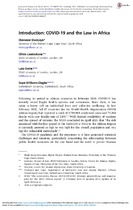| dc.contributor.author | Durojaye, Ebenezer | |
| dc.contributor.author | Lwabukuna, Olivia | |
| dc.contributor.author | Oette, Lutz | |
| dc.contributor.author | Williams-Elegbe, Sope | |
| dc.date.accessioned | 2022-02-01T12:10:35Z | |
| dc.date.available | 2022-02-01T12:10:35Z | |
| dc.date.issued | 2021 | |
| dc.identifier.citation | Durojaye, E. et al. (2021) Introduction: COVID-19 and the Law in Africa. Journal of African Law, 65, S2. pp. 173 - 180. https://doi.org/10.1017/S0021855321000437 | en_US |
| dc.identifier.uri | https://doi.org/10.1017/S0021855321000437 | |
| dc.identifier.uri | http://hdl.handle.net/10566/7141 | |
| dc.description.abstract | Following its arrival in African countries in February 2020, COVID-19 has
severely tested fragile health systems and economies. Since then, it has
taken a heavy toll on individual lives and collective wellbeing. In late
February 2021, “all 47 countries [in the World Health Organization (WHO)
African region] had reported a total of 2,789,965 confirmed cases and 71,204
deaths with case fatality rate of 2.6%”.
1 With limited availability of vaccines
and the spread of variants, the WHO concluded in April 2021 that “the risk
associated with further spread of the SARS-CoV-2 VOCs in the African Region
is currently assessed as high to very high for the overall population and very
high for vulnerable individuals”.
2
The COVID-19 pandemic and the responses to it have generated common
challenges and tensions, particularly concerning the relationship between
public health measures on the one hand and the need to protect human | en_US |
| dc.language.iso | en | en_US |
| dc.publisher | Cambridge University Press | en_US |
| dc.subject | COVID-19 | en_US |
| dc.subject | South Africa | en_US |
| dc.subject | Law | en_US |
| dc.subject | Health systems | en_US |
| dc.title | Introduction: COVID-19 and the Law in Africa | en_US |
| dc.type | Article | en_US |

